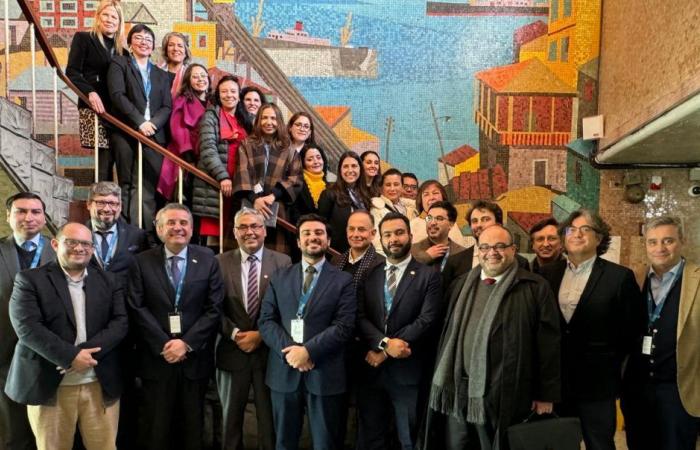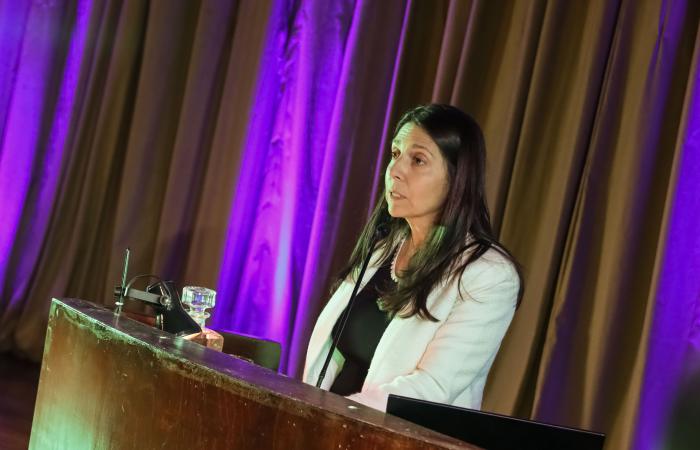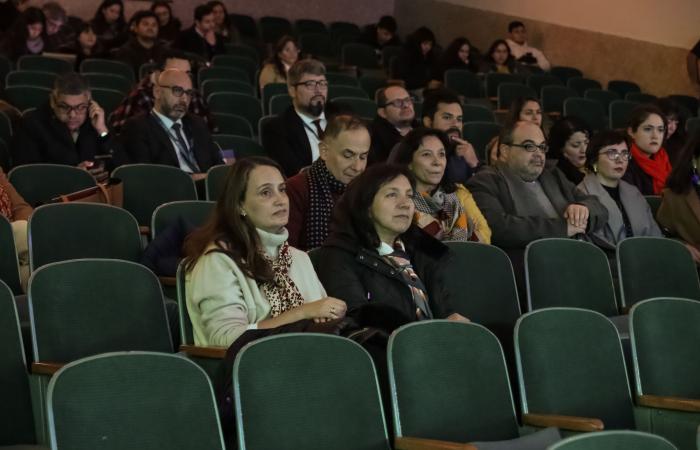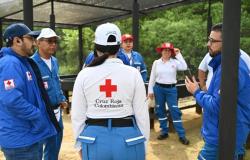Teachers from different universities in the country gathered at the activity organized by the Civil Law Department of the Law School.
The Faculty of Law of the University of Valparaíso was the scene of the eighth version of the National Family Law Conference, an event that brought together on June 12, 13 and 14 nearly 50 professors from different universities in Chile, and which was organized by the Civil Law Department of the academic unit, following the call made by the Consortium of Universities organizing the National Family Law Conference.
The activity is organized annually with the aim of disseminating the results of research on Family Law, Children and Adolescents, and expanding the lines of research, as well as making visible practical problems that have arisen in Family Law in recent times. which raises the attention of both legal operators and legal theorists.
Opening
The activity at the beginning of the conference was led by the dean of the Faculty of Law and president of the Department of Civil Law of the School of Law, Ricardo Saavedra, on which occasion Macarena Sáez, executive director of the Women’s Law Division, spoke. of the Human Rights Watch Organization and co-founder of the Network of Latin American Academics on Gender and Sexuality. The vice dean of the Faculty of Law, Inés Robles, and the director of the School of Law, Claudio Oliva, also participated.
On the occasion, Dean Ricardo Saavedra indicated in his welcoming remarks that “it is an honor for this Faculty to have been commissioned to organize the Eighth National Conference on Family Law, without a doubt one of the main academic events at the national level in the field of Private Law. We appreciate the trust that the honorable Consortium of organizing Universities placed in us to carry out this no small task.”
In connection with the development in online mode of the second day of the event – in response to the preventive alert by the frontal system that affected the central area of the country that week – the authority indicated that “Family Law has an intense connection with the modern and the need for adaptation. Unlike the rest of Private Law—which has usually shown enormous stability over time—Family Law has the constant challenge of adapting to new circumstances and changes in society, to the point that reforms in this area are “They have been characterized not only by their number, but also by their depth and radicality, that is, by constituting true paradigm shifts.”
“This forces us to be very attentive to the social dynamics that affect the family, and that in recent decades have developed at a certain pace that we could describe as dizzying. That Family Law can respond quickly to these requirements in the condition of its effectiveness, and that it does so adequately, also implies the need for certain instances of rest or rest that make reflection feasible, which implies the need to connect within of the year. That is the value of these days and the availability of those who dedicate themselves to the study of this discipline,” he concluded.
Subsequently, Macarena Sáez gave the conference “Family Law and Human Rights”, where she referred to the complexity of relationships that form the basis of Family Law.
In the instance, he explained that “the tension between real families and ideal families and the struggle over how one or the other is reflected in the Law, intersects with the development of the international Human Rights system. Since the Universal Declaration of Human Rights and the American Declaration of Rights and Duties of Man, there is recognition of the human right to the family. But is that a recognition that the Law does not interfere in my family? Or is it a recognition that everyone can have a family in accordance with the cultural idea that each country has of the family? What happens if the family ideal is contrary to other rights, such as the right to equality and non-discrimination? For example, is it consistent with the right to equality and non-discrimination that the husband is the administrator of the marital partnership and that this is the base system? How should we review the institutions of Family Law in light of the right to equality and non-discrimination and other Human Rights?”
“Both the universal system and the American system have protected the family in a double dimension. On the one hand, the right to be free from undue interference in the family, and on the other, a right to form a family. The first dimension is where historically they hid and we still hear the idea of ’don’t get into fights as a couple’, trying to achieve conciliation and for couples to settle when there has been violence. But it should also serve to protect the privacy of non-traditional families, and should have been the axis to protect families made up of same-sex couples. But it is in the second dimension where the limits and expansion of the right to have the family that each person wants are debated, or whether one can have the right to only have the family that the Law itself has decided is valid as such,” he added.
Exhibition tables
The Eighth National Conference on Family Law consisted of fourteen exhibition panels, divided into thematic tables that took place in parallel in the Ítalo Paolinelli Monti Council Room and the Luis Vicuña Suárez Classroom of the Law School, with the exception of the conference on Thursday, June 13, the occasion when a preventive alert due to the frontal system that affected the central area of forced these exhibitions to be developed via Zoom.
In the instance, topics related to “Family and affiliation”, “Emerging issues in family justice”, “Childhood and adolescence”, “Aspects of Family Law”, “Person and childhood”, “Maintenance obligations” were worked on. , “Family sphere and property aspects”, “Marriage and termination of the marital relationship”, and “Family and person”.
The professors who participated in the Conference are part of the academic and research staff of different universities in Chile, who went through a prior process of selecting papers by the organizing committee of the meeting. Teachers from the University of Valparaíso, Pontifical Catholic University of Valparaíso, University of Chile, Autonomous University of Chile, Austral University of Chile, University of Santiago de Chile, Adolfo Ibáñez University, Central University, Catholic University of the North, University of the Andes participated. , Catholic University of the Santísima Concepción, Diego Portales University, Santo Tomás University, Tarapacá University, Talca University, Development University, Pontifical Catholic University of Chile, Alberto Hurtado University and Antofagasta University.
Closing ceremony
The closing activity of the Eighth National Family Law Conference was headed by the dean of the Faculty of Law, Ricardo Saavedra, and also participated by the vice dean of the Faculty of Law, Inés Robles, and the director of the School of Law, Claudio Oliva.
In the instance, the closing words were delivered by the director Claudio Oliva, who indicated that “first, I would like to congratulate you on these very successful days, and that they come to demonstrate once again how misleading the old dichotomy taken from Rome can be, as “maybe misunderstood, between Private Law and Public Law, because we are in the area that is normally understood as Private Law, but the list of topics that they worked on shows the obvious public interest of the vast majority of these.”
“So, it is not so true that Private Law looks at the exclusive and individual interest of those who interact through it, but that it has, of course, a very relevant public interest committed to it. And even more so in the specific case of Family Law, which has occupied in recent decades, perhaps with particular preeminence, a relevant place in the progress of Law, which has attempted to accompany and sometimes improve the progress that society itself is making. ”, he pointed out.
Later, Professor Rodrigo Barría, representative of the Alberto Hurtado University before the Consortium of Universities organizing the National Family Law Conferences, addressed the public, explaining that the minutes of last year’s Conferences could not be presented, due to problems. logistics.
Then it was the turn of academic Carlos Céspedes, dean of the Faculty of Law of the Catholic University of the Santísima Concepción, who announced that the aforementioned study house will be the headquarters of the Ninth National Conference on Family Law, to be held next year. .
Finally, the professor from the University of Valparaíso and coordinator of the Eighth National Conference on Family Law took the floor, who began her intervention by thanking “the entire team that has been behind the organization of the event, the authorities, professors of the Department of Civil Law, administrative and professional staff, assistants, students, and all those who have allowed you to feel that these days have been well organized.”
“Also, thank the Consortium of Universities organizing the National Family Law Conference, for having supported us at the time of difficult decisions; to Macarena Sáez, for her warmth and exciting opening conference, and to the exhibitors for their presentations, patience, understanding and for the level of discussion that was achieved at the event,” he concluded.
The audiovisual record of the Eighth National Family Law Conference can be reviewed here: https://cutt.ly/FesS23wK.
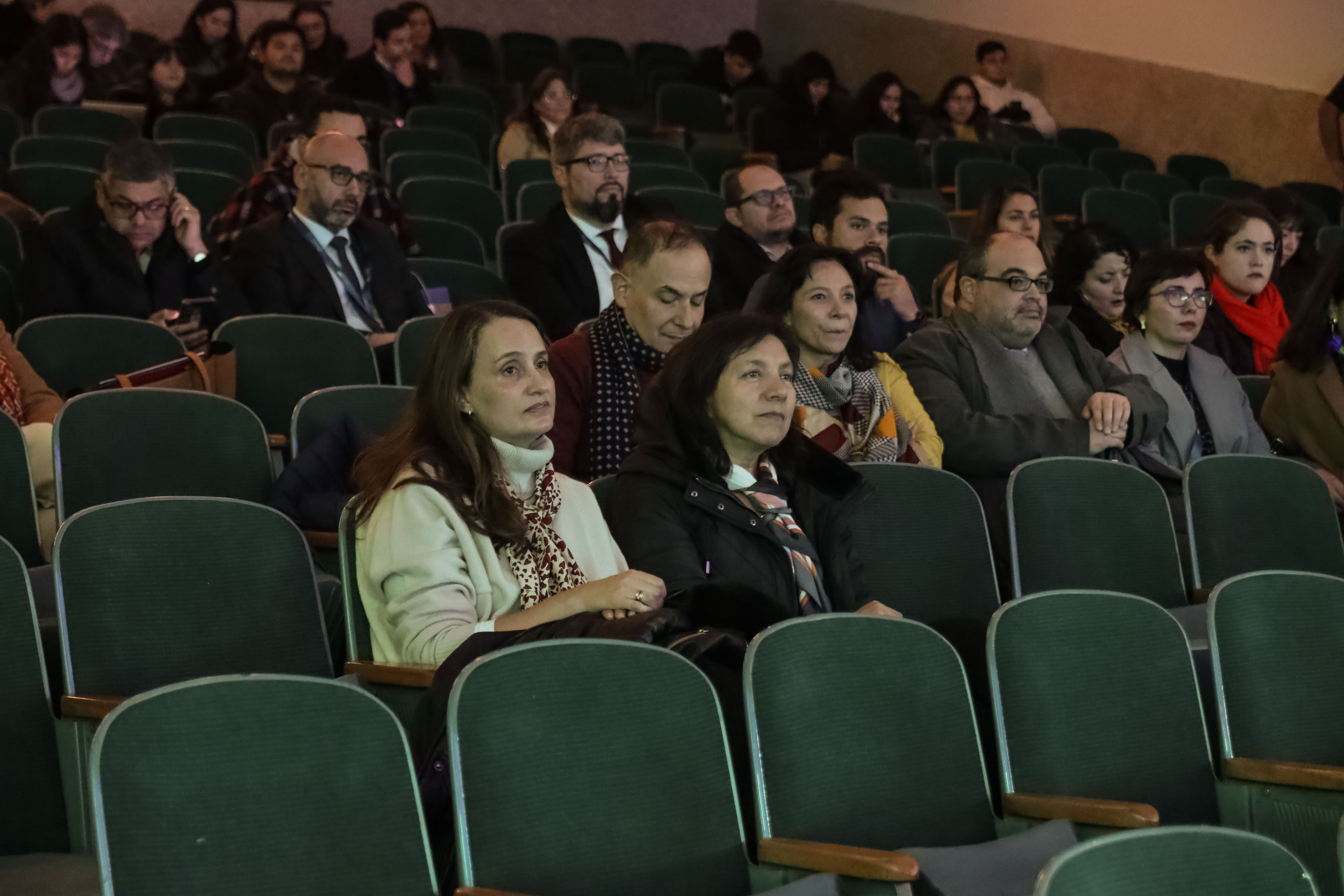
Note: Camila Cortez

